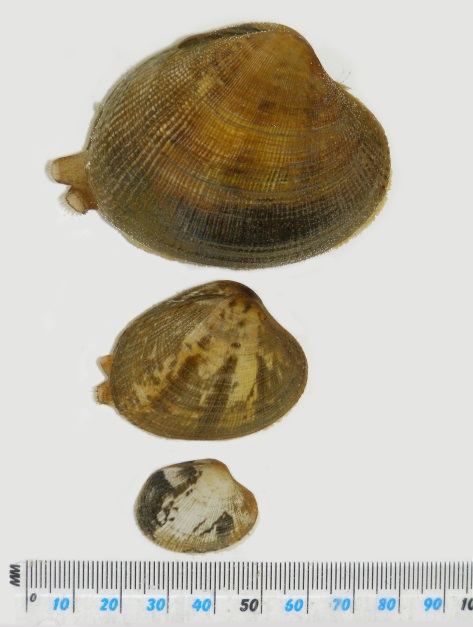Over 20 delegates from fisheries and conservation agencies and universities contributed to a seminar at Bournemouth University on the management of emerging and novel fisheries. With rising temperatures and increasing global trade and communications, species that are not native to the North east Atlantic are becoming established around our coast. Most of these are not currently of any concern; however a small proportion can become invasive and cause negative ecological impacts. Yet some non-native species have become beneficial and now support important fisheries, such as the Manila clam in Poole Harbour. There is therefore a tension between developing the economic potential of these new fisheries and risk to biodiversity and species and habitats within protected areas.

Manila clams from Poole Harbour
Photo: John Humphreys jhc Research.
The seminar considered three main questions:
- What can we learn from the history of ‘invading’, yet economically valuable shellfish? Is the pattern of spread any different from other invasions?
- What are the ecological and economic threats, benefits and opportunities from non-native yet valuable species?
- How can we mitigate potential ecological damage through sustainable management and harvesting?
We especially valued contributions from Dr Rosa Freitas and Dr Stefania Chiesa from the University of Aveiro, Portugal, who carry out research on the impacts of some of these species in southern Europe.

Dr Stefania Chiesa from University of Aveiro
Dr. Roger Herbert
Dept. Life and Environmental Sciences
rherbert@bournemouth.ac.uk
Find out more about the Brownsea Marine and Coastal Observatory
 Call for abstracts – Marine Protected Areas: Science, Policy & Management
Call for abstracts – Marine Protected Areas: Science, Policy & Management










 Dr. Ashraf cited on ‘Modest Fashion’ in The Guardian
Dr. Ashraf cited on ‘Modest Fashion’ in The Guardian NIHR-funded research launches website
NIHR-funded research launches website Academics write for newspaper in Nepal
Academics write for newspaper in Nepal New paper published on disability in women & girls
New paper published on disability in women & girls Global Consortium for Public Health Research 2025
Global Consortium for Public Health Research 2025 MSCA Postdoctoral Fellowships 2025 Call
MSCA Postdoctoral Fellowships 2025 Call ERC Advanced Grant 2025 Webinar
ERC Advanced Grant 2025 Webinar Horizon Europe Work Programme 2025 Published
Horizon Europe Work Programme 2025 Published Horizon Europe 2025 Work Programme pre-Published
Horizon Europe 2025 Work Programme pre-Published Update on UKRO services
Update on UKRO services European research project exploring use of ‘virtual twins’ to better manage metabolic associated fatty liver disease
European research project exploring use of ‘virtual twins’ to better manage metabolic associated fatty liver disease